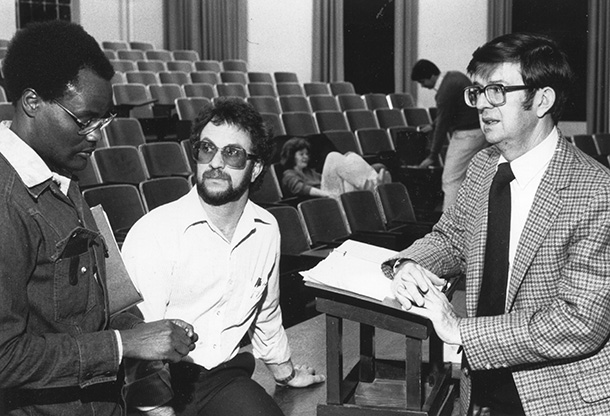Calvin Shenk ’59 does not have to face the existential question of whether he would be willing to die in a nonviolent act to save the life of another person. He would.
The test came in 1985. Shenk and his wife Marie were leading an EMU group that was staying temporarily in a Palestinian community in the Middle East. Shenk heard an argument outside his apartment door and saw an Israeli soldier put his gun in the face of a Palestinian man. He jumped between the two, and urged the men to go their separate ways. They did.
“Don’t call me brave – it was just the right thing to do,” insists Shenk. “When you see a rifle pointed at a person right outside your door you don’t think, you just do it.”
As a member of EMU’s cross-cultural task force in 1981, Shenk brought 14 years of living in Ethiopia and a passion for the transformative possibilities of immersion in another culture.
In September 1983, Shenk penned an essay justifying the cross-cultural requirement for every EMU undergraduate. “This kind of education will be both painful and enjoyable,” he wrote. “The results will not always be predictable. We will experience anger and exhilaration, depression and vision.
“But growth will occur, and that is what college is for. Such education will make us better citizens of the global village and better members of God’s international kingdom, the church.” (Read this delightfully readable essay.)
In his 1985 baccalaureate speech, Shenk stressed the importance of losing one’s narrow-mindedness:
Today many people wrap Christ in an American flag. But we who follow Christ follow him to the world. We are global people. As we experience other cultures our attitudes and values change. This need not be frightening. We develop more world-mindedness and less chauvinism, bigotry and narrow-mindedness ….
As you develop greater understanding for other cultures, you see your own culture from another perspective. This causes you to both appreciate and critique your culture. You have mixed feelings about our democratic system, educational system, technological development, capitalist consumerism and quest for military supremacy. You have begun to see the back side of our culture – aggressiveness, depersonalization, arrogance, individualism. It isn’t possible to feel culturally superior. We can’t assume that our way is right.
Shenk added that it was “false modesty” to fail to share the good news about Christ. “We come to new understandings of Christ as we enter into conversation but it is always consistent with the biblical witness of who Christ is.”
Shenk’s first cross-cultural experience was teaching Bible and world religions and doing other mission work in Ethiopia under Eastern Mennonite Missions for 14 years. (Marie taught bookkeeping and typing there.)
Shenk earned a PhD in religious education from New York University in 1972 and then joined the Bible and religion faculty of EMU in 1976. Marie ’59, MA ’98 (in religion), was an administrative assistant to the academic dean from 1976 to 1990. The Shenks led their first of four EMU trips in the fall of 1978, taking students to the Middle East.
In 1994 the Shenks began an assignment in Israel and Palestine under Mennonite Board of Missions (a precursor to Mennonite Mission Network), and Mennonite Central Committee. For the next seven years, until 2001, the couple lived six months of every year in Jerusalem, returning to Harrisonburg the remainder of the year where Shenk continued to teach at EMU. In 2002, Shenk retired from EMU. Marie died in 2010. The Shenks raised three children, all graduates of EMU: Doug ’86, Duane ’90 and Donna (Sensenig) ’91.
—Rachael Keshishian & Bonnie Price Lofton
